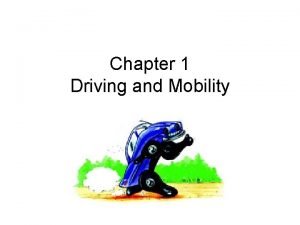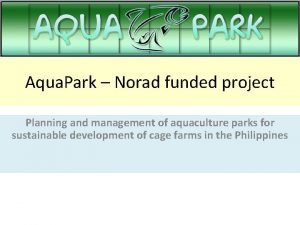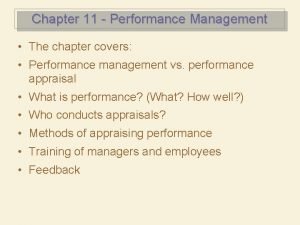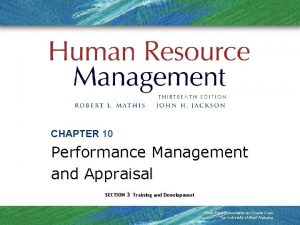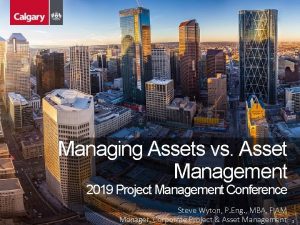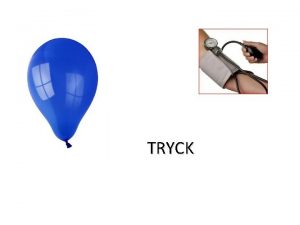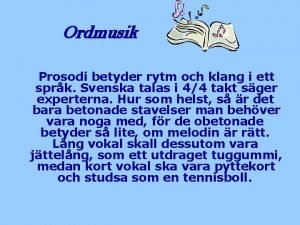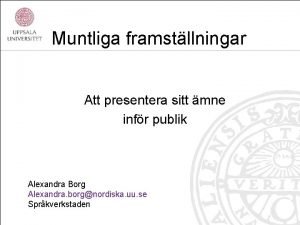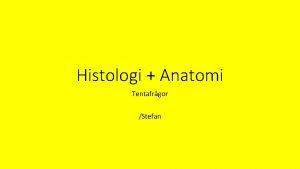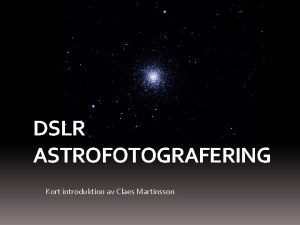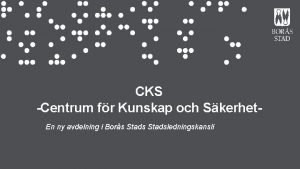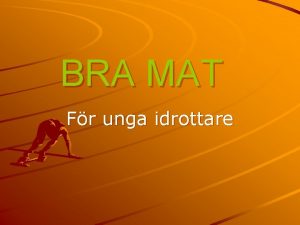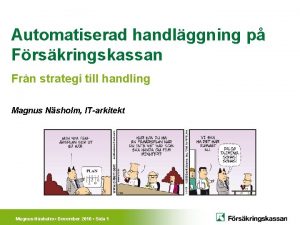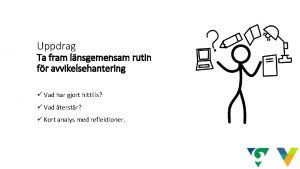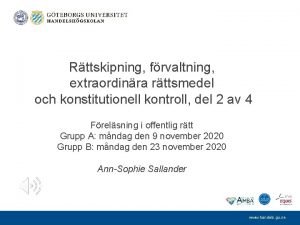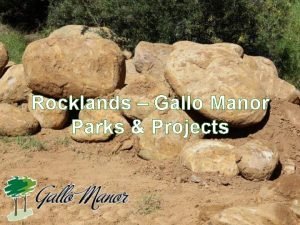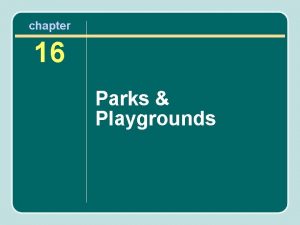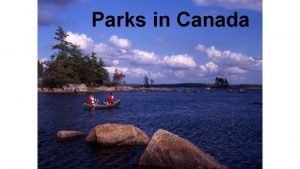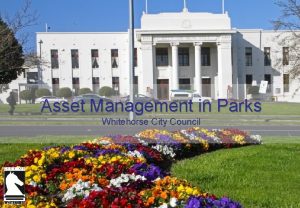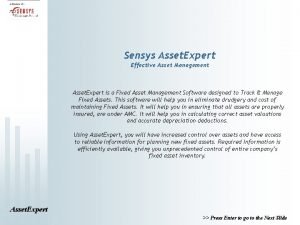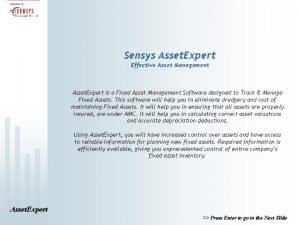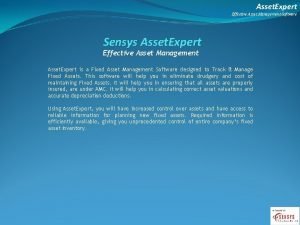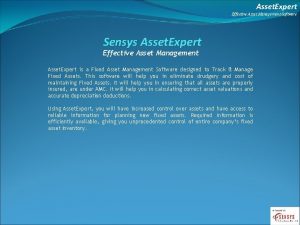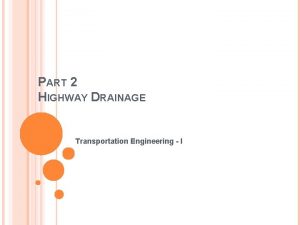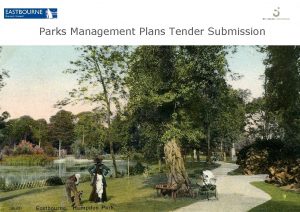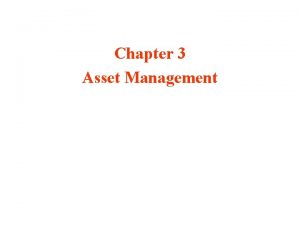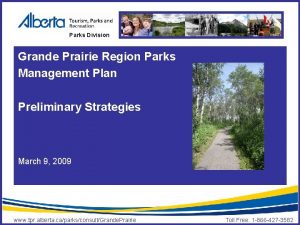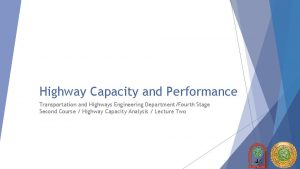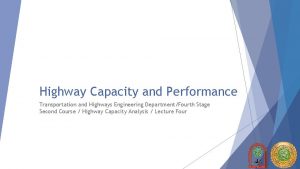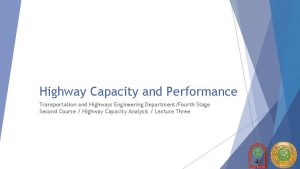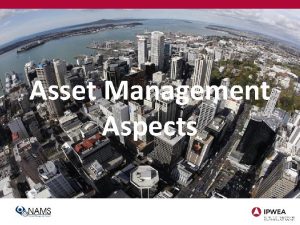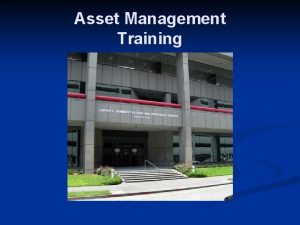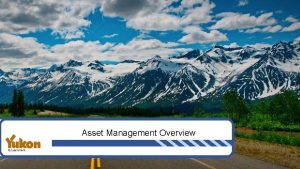Transportation Asset Management Performance Management for Parks Highway







































- Slides: 39

Transportation Asset Management & Performance Management for Parks Highway Corridor 1

Vic Winters Asset Management Engineer 2

Introduction • Asset Management • Performance Management • Corridor Management • Parks Highway Project Introduction • Geotechnical Asset Management • Condition Indices • Levels of Service • Performance Measures 3

TRANSPORTATION ASSET MANAGEMENT 4

Commissioner Luiken on AM “The improvements that we construct today and plan for tomorrow must be managed as assets and preserved for future generations. We must become as skilled at optimizing the lifecycle costs and overall performance of our transportation assets as we have traditionally been at engineering and building them. ” - Commissioner Marc Luiken STIP Introduction Letter February 9, 2012 5

June 2012 Strategic Direction 6

7

Asset Management Framework for managing transportation assets to meet a required level of service in the most costeffective manner for present and future customers • AM addresses physical assets • FHWA promoting and states are using AM • Promotes improved decision-making • Elements of AM: 8

Examples of Asset Management Already Operating in DOT&PF • • • Bridge Management Pavement Management Material Site Inventory Unstable Slope Management Culvert Inventory Sign Inventory 9

Transportation Asset Management • Transportation Asset Management is a framework for managing physical assets to meet a required level of service in the most cost-effective manner for present and future customers. Elements of TAM include: • Data Collection: Know what assets you have and their condition. • Asset Knowledge & Understanding: Learning the Life Cycle of the assets. Forecast performance over time. Identify risks associated with and threats to the assets. Establish Levels of Service. Create Performance Measures to track performance throughout the life cycle to improve understanding. • Analysis – Conduct benefit/cost and life-cycle cost-based calculations to formulate candidate project alternatives. • Decision-Making Support – TAM, GAM and PM support decision -making about project extents, timing, scope and priority. 10

Asset Management Process 11 of ___

PERFORMANCE MANAGEMENT 12

Performance Management • Performance Management translates transportation agency policies and goals (Safety, Efficiency, System Preservation, etc. ) into measures or metrics that can be tracked to ensure achievement of the agency’s objectives. • Often displayed to public by means of a “dashboard” indicating progress towards goals.

CORRIDOR MANAGEMENT 14

Corridor Management • Why should we Manage Corridors? • We don’t have networks of roads with multiple ways to move along them – we have isolated corridors, most with no viable or reasonable alternative route. • The ability of our corridors to move people and goods in the transportation system IS the “Asset” – keeping the corridors performing is our primary purpose. • What is Corridor Asset Management? • Managing corridor assets essential for decision-making using TAM/GAM/PM to support decisions about selection of project extents, location, scope, timing, maintenance decisions, etc. to meet performance objectives. 15

PARKS HIGHWAY CORRIDOR MANAGEMENT PROJECT 16

OIL & GAS Minerals Dalton Highway Minerals Richardson Highway Parks Highway Glenn Highway Ketchikan


Dave Stanley Chief Engineering Geologist 19

GEOTECHNICAL ASSET MANAGEMENT 20

Geotechnical Asset Management • GAM applies asset management principles and framework to managing geotechnical assets including: • Rock slopes, rockfall mitigation fences and barriers, draped • • • mesh, anchors, rock bolts. Soil slopes. Embankments. Materials sites. Retaining walls. Foundations – bridges, high tower lighting, signs, etc. • GAM Purpose: managing geotechnical elements of transportation corridors to meet service requirements in support of functionality and performance of transportation corridors. 21

GAM and Performance Management • Geotechnical Asset Management applies the TAM framework to managing Geotechnical Assets such as slopes, embankments, retaining walls, materials sites, etc. • Performance Management is a system that ties agency performance to agency policies and goals through use of performance measures that track the elements of service the agency provides. DOT&PF uses the Performance Electronic Tracking System (PETS) to track and report on progress in meeting service levels. • TAM (and GAM) and Performance Management are inseparably linked. 22

Asset Management Process 23 of ___

Condition Index • Many asset types in a corridor: pavement, bridges, slopes, culverts, signs, retaining walls, etc. • How can we consider together the condition of all the essential assets for good decision-making? • Condition Index: rational means of portraying the condition of disparate assets.

Condition Index Scale Comparisons

Simplified Condition Index • Transform diverse CIs (numeric and descriptive) to a single simple scale in order to make a start with asset condition estimates. • Why? – Put together with Condition Curve to predict performance for Lifecycle cost analysis. 26

Condition vs. Cost C o n d i t i o n C o s t Excellent to Good Condition Fair to Marginal Condition Poor to Failed Condition Time

Pavement Example 70 40 Minimum Service Level 28

Example: Geotechnical Assets C o n d i t i o n Rock Slope Embankment Over Permafrost Rock Quarry Years of Service C o s t

Performance Measures for Slopes Level of Service Avoid road closures due to rockfall or landslide incidents. Performance Measure Track number of road closures per year per District. Re-open roads closed due to rockfall or landslide For each District, track time of road closures due to rockfall or in one day or less. For events of 3, 000 cu yds or landslides per event per year. less debris on road, reopen within 8 hours. Geotechnical staff respond within one day of notice for incidents with road closure or with injury or property damage. Track response time for District or Statewide geotechnical staff per event per year for qualifying events. Maintain draped wire mesh for rockfall mitigation in fair or better condition. Track condition of draped wire mesh in each District on semiannual basis as number of 100 ft intervals in good, fair or poor as a percentage of total number of 100 ft segments in each District. Maintain rockfall mitigation barriers in each District (concrete barriers, high energy flexible barriers, berms, walls, etc. ) in fair or better condition Assess and report condition of each rockfall mitigation barrier each year and report as good, fair or poor on semi-annual basis. Track condition as percentage of total linear feet of all barriers in District per year. Reduce overall M&O operating cost associated with unstable rock and soil slopes Track annual cost of M&O attributed to unstable slopes using Maintenance Management System data. Achieve 2. 5% reduction per year. 30

Parks Highway Corridor Asset Management Phase I - Project Scoping & Development Phase II - Data Collection & Integration on Web Page Phase III - Database Development Phase IV - Corridor Asset Management Plan 32

PHASE II - OBJECTIVES 1. Identify existing data essential to decision-making for developing and managing Parks Hwy corridor. Create access to the data and databases. Get the right data to the right people at the right time. 2. Provide access to data and databases through a “one-stop shop” web page through a GIS-based map presentation of data plus links to the databases dispersed throughout the Department. 3. Communicate about the project and its context in asset management. Communicate to staff that we will be managing performance and assets through asset management. 4. Promote data-sharing to support decision-making for the corridor. Collect data once - use many times. 5. Develop a Performance Improvement Project. 33

PHASE II – DESIRED OUTCOMES 1. Identify essential data for corridor management and create a data catalogue 2. 3. 4. 5. 6. 7. 8. 9. for existing data. Integrate project with overall TAM implementation for the Department. Remove institutional barriers to asset management between regions and functional groups. Recognize that functional groups must collect, manage and preserve data for corridor management. Preserve existing data. Promote use of GIS to support corridor management. Develop understanding of solutions to data governance issues. Capture new data as design and construction projects progress. Create specifications for contractor to provide an inventory and condition survey for assets at project closeout. 34

Parks Hwy Corridor Performance Improvement Project Elements Seven culvert replacements and drainage improvement sites from MP 145 – 257 to stabilize embankment and extend life of pavement Two “deep patch” sites at MP 151 and MP 241 to repair settlement and nuisance slides at edge of pavement and reduce M&O costs Rockfall mitigation site at MP 215 to install draped wire mesh over rock slope to prevent falling rock from landing in lanes and impeding traffic flow and causing accidents and injury Bridge Deck Repairs and guardrail improvements at Flood Creek and Panguini Creek to improve condition rating, extend service life and delay replacement date Chip Seal from MP 197205, 218 -225, 248 -262 to preserve surface, improve condition ratings and extend service life of pavement Crack Sealing of thermal cracks from MP 154 -162, 191 -193, 210 -211, 213217, 217. 5 -218, 225 -231 to extend service life and delay replacement date 35

PARKS HIGHWAY DATA WEB PAGE DEMONSTRATION 36

Corridor Data Flow Department Decisions Project Alternatives Corridor Asset Management Data Asset Managers M&O M M S & S B B P a v e m e n t P M S ROW Environmental Bridges R I G H T S E N V I R O N M E N T B R I D G E S O F W A Y P O N T I S Ports & Harbors Materials E M B A N K M E N T S S L O P E S T A B I L I T Y M A T E R I A L S I T E S R E T A I N G W A L L S P O R T S / H A R B O R S Research R E S E A R C H Regional Project-related Data 37

38

Asset Management Process 39 of ___

QUESTIONS? 40
 Highway transportation system
Highway transportation system What are the parts of the highway transportation system
What are the parts of the highway transportation system Drive right chapter 1
Drive right chapter 1 Aqua project management
Aqua project management Behaviorally anchored rating scale
Behaviorally anchored rating scale Performance management vs performance appraisal
Performance management vs performance appraisal Managing assets vs asset management
Managing assets vs asset management Fspos
Fspos Typiska novell drag
Typiska novell drag Tack för att ni lyssnade bild
Tack för att ni lyssnade bild Returpilarna
Returpilarna Varför kallas perioden 1918-1939 för mellankrigstiden?
Varför kallas perioden 1918-1939 för mellankrigstiden? En lathund för arbete med kontinuitetshantering
En lathund för arbete med kontinuitetshantering Underlag för särskild löneskatt på pensionskostnader
Underlag för särskild löneskatt på pensionskostnader Vilotidsbok
Vilotidsbok Sura för anatom
Sura för anatom Densitet vatten
Densitet vatten Datorkunskap för nybörjare
Datorkunskap för nybörjare Boverket ka
Boverket ka Debattartikel mall
Debattartikel mall För och nackdelar med firo
För och nackdelar med firo Nyckelkompetenser för livslångt lärande
Nyckelkompetenser för livslångt lärande Påbyggnader för flakfordon
Påbyggnader för flakfordon Kraft per area
Kraft per area Publik sektor
Publik sektor Bo bergman jag fryser om dina händer
Bo bergman jag fryser om dina händer Presentera för publik crossboss
Presentera för publik crossboss Jiddisch
Jiddisch Vem räknas som jude
Vem räknas som jude Klassificeringsstruktur för kommunala verksamheter
Klassificeringsstruktur för kommunala verksamheter Luftstrupen för medicinare
Luftstrupen för medicinare Bästa kameran för astrofoto
Bästa kameran för astrofoto Cks
Cks Byggprocessen steg för steg
Byggprocessen steg för steg Bra mat för unga idrottare
Bra mat för unga idrottare Verktyg för automatisering av utbetalningar
Verktyg för automatisering av utbetalningar Rutin för avvikelsehantering
Rutin för avvikelsehantering Smärtskolan kunskap för livet
Smärtskolan kunskap för livet Ministerstyre för och nackdelar
Ministerstyre för och nackdelar Tack för att ni har lyssnat
Tack för att ni har lyssnat
